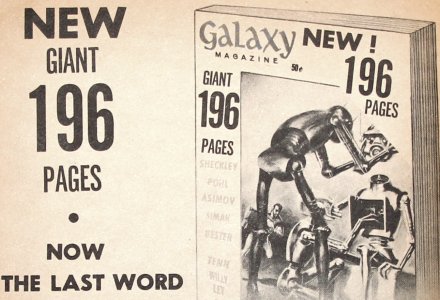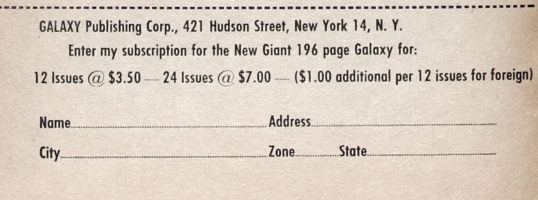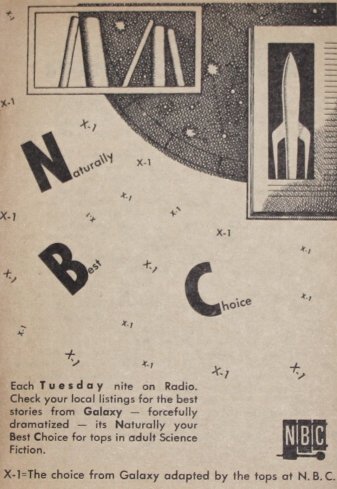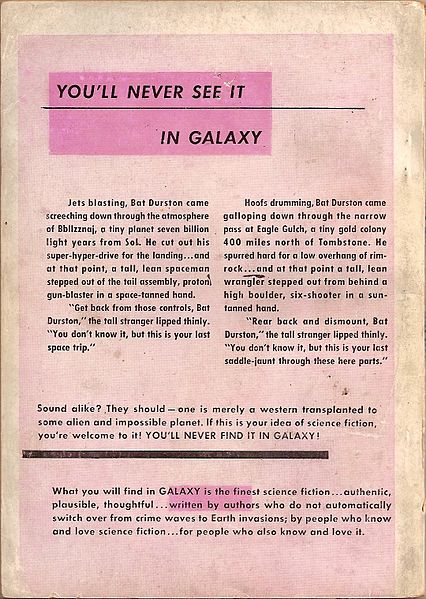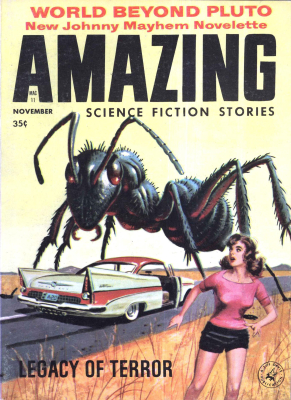
The December 1958 Galaxy came in the mail on the 26th, and I've read about half of it. Willy Ley's column, on the amazing alien world beneath the surface of the sea, is fascinating stuff. The third part (of four) of Sheckley's Time Killer is engaging, though not in the same class as most of his short stories. The short murder mystery, "Number of the Beast," by Fritz Leiber, might have made an interesting novella; as it is, it is too underdeveloped to be interesting. Too bad. Fritz is good.
But what inspired this blog was veteran Jack Vance's latest: "Ullward's Retreat." It is a tale about how a little bit of privacy and living space is a status symbol in an overcrowded world; but, in a society used to being crowded together, too much privacy and living space is undesirable.
Recent figures show that our population is about to hit the 3 billion mark. Given that we reached 1 billion in 1800 and 2 billion in 1927, it is understandable that a good deal of science fiction depicts an overpopulated future.
I find it laughable when an author describes shoulder-to-shoulder crowding with a population of (gasp) 7-10 billion! I recognize that some of our cities are pretty crowded these days, but even tripling the population is not going to squish people together–it will just spread the cities out. Most of the world is still uninhabited, and I can only guess that science will make more of the world inhabitable.
Vance's Earth, however, has a whopping 50 billion souls on it, and that seems a reasonable strain on space limitations. The story starts in the spacious apartment of the eponymous Ullward, a wealthy man. His home comes with a real garden and an honest-to-goodness oak tree. His guests are suitably impressed: their homes are tiny cubicles with doors that exit right onto the commuter slidewalks. To overcome claustrophobia, walls are replaced with image panes that display scenery to convey a convincing illusion of greater space.
Interestingly enough, in Ullward's Retreat, whole planets are available to colonize with relative ease. Ullward leases a continent and invites his friends to visit. They quickly tire of the vast vistas and the pervasive loneliness. They pine to investigate the "good parts" of the world, which are rendered off-limits by the planet's owner. Ultimately, Ullward forgoes his enormous estate and returns to his comparatively (to his peers, not to us) extravagant abode, which has proven, despite its smaller scope, much more impressive to Ullward's friends. The people in Ullward's Retreat appreciate their little privileges, but big privileges are overwhelming, incomprensible, even invalidating. It's the difference between having a 1 karat diamond ring and a 50 karat hunk of diamond in your closet — one is impressive and socially desirable, the other is an odd curiosity.
Vance's story is a trivial one and not to be taken especially seriously. I did like some points, however. For one, it depicts an overcrowded future as not dystopian, simply different. Anyone who has been to Japan (before or after the war) has seen a society far more used to crowding than ours. They don't seem to mind it. They just make do with smaller gardens and narrower houses, adapt with greater politeness and cultural rigidity. In fact, after spending time in Japan, you'll often marvel at (and even be a little disgusted by) the tremendous, inefficient sprawl that characterizes our cities.
I also like that the ability to colonize does not reduce the population pressure on mother Earth. Columbus and Cabot finding America did not make Europe any less populated. It just led to the Americas being more populated (after the colonists did some regrettable depopulation of the natives, of course). Moreover, in a world where people are happier in close quarters with their neighbors, it makes sense that the colonizing spirit would be correspondingly lower.
Was it a good story? Is it worth 35 cents? Sort of, and, probably not. Nevertheless, it did provoke thought, and can you put a price on that?
Stay tuned. I'll have more on this month's Galaxy in a day or two!
(Confused? Click here for an explanation as to what's really going on)
This entry was originally posted at Dreamwidth, where it has comments. Please comment here or there.

